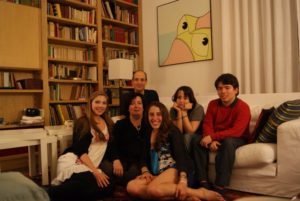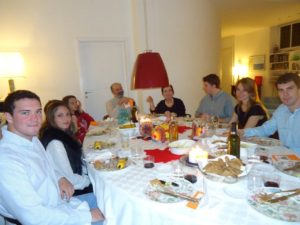Syracuse Florence students live with an Italian host family, an experience that offers linguistic and cultural benefits throughout the semester. The combination of formal Italian lessons in class and the opportunity to practice speaking in real-life situations at home, is the most effective way to learn a language. Moreover, being part of a family means participating directly in Italian daily life—the best way to gain insights into and integrate fully with the local culture.
Students repeatedly describe the host family experience as the highlight of the abroad experience. As one student put it: “Ten years from now I may not recall the significance of the Brancacci chapel, but I’ll never forget how my Italian mother threw the pasta in the pot each night!”
Matching Students with Local Hosts
Your host family will greatly influence your view of Italian life, people and culture. Therefore, using the information from your housing application, the housing office chooses a family that is compatible with your needs. Host families are carefully screened by our Housing Office. They come from all walks of life and professions, and many have hosted Syracuse students for years.
Location of Host Families
Most host families are between a five and twenty five minute commute from the Syracuse Florence Center building.
The Italian Family Today
Consciously or not, you may arrive with pre-formulated ideas about Italian families–perhaps based on a friend’s experience or from your own Italian-American heritage. The Italy you encounter upon arrival can be quite different from expectations.
 Just as American society changed drastically during the 1960s and 70s, Italian society, too, has seen major social changes since then. The increase in women working outside the home, the number of young people who seek higher education, and the legalization of divorce have all caused profound changes within the family structure since the 1970s. Yet family values are still the focus of Italian society, and the family has remained a very close social unit. Whether married, single, or divorced, all Italians tend to maintain strong ties to parents, adult children, and other relatives. Often generations share housing; grown children or elderly parents may live with your hosts. Even if they do not share a home, extended families may eat lunch (pranzo) and/or dinner (cena) together every day or on Sundays. Elderly parents are respected and looked after, sometimes on a daily basis, whether living with their children or on their own.
Just as American society changed drastically during the 1960s and 70s, Italian society, too, has seen major social changes since then. The increase in women working outside the home, the number of young people who seek higher education, and the legalization of divorce have all caused profound changes within the family structure since the 1970s. Yet family values are still the focus of Italian society, and the family has remained a very close social unit. Whether married, single, or divorced, all Italians tend to maintain strong ties to parents, adult children, and other relatives. Often generations share housing; grown children or elderly parents may live with your hosts. Even if they do not share a home, extended families may eat lunch (pranzo) and/or dinner (cena) together every day or on Sundays. Elderly parents are respected and looked after, sometimes on a daily basis, whether living with their children or on their own.
Italian Meals
 Food and meals in Italy are a very important part of family life. They tend to be more formal affairs where the entire family sits down to a carefully-set dinner table, tablecloth and all.
Food and meals in Italy are a very important part of family life. They tend to be more formal affairs where the entire family sits down to a carefully-set dinner table, tablecloth and all.
Italians have certain taboos when it comes to food combinations and what is appropriate to eat when. For example, cappuccino is considered a morning beverage and is not taken after lunch or dinner (because the quantity of hot milk would interfere with digestion after a large meal). Instead, caffe’ (Espresso) or caffe’ macchiato (Espresso with a spot of milk) can be ordered anytime of day. Italians drink water and wine at meals (generally no soft drinks and never milk), although with pizza it is common to have a soft drink or beer.
Italian Dress Code
Italians are generally proud of their clothing styles and traditions. For most people, dressing appropriately is important. How you dress will impact how you are perceived by Italians. People dress according to the season and rarely deviate from seasonally-appropriate attire. In general, they tend to wear warmer clothes than their North American counterparts and may worry about you getting a frescata (“catching a chill”) if you do not sufficiently cover yourself in the winter or when the seasons change. Florentines also tend to wear classic styles, preferring basic colors such as black, beige, and white and dress elegantly in the city. Flip flops are for summer holidays at the beach and sweatpants are for the gym.
